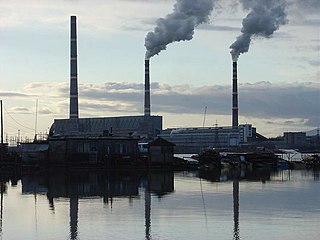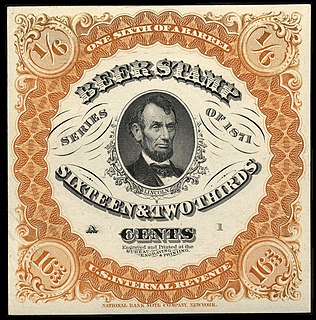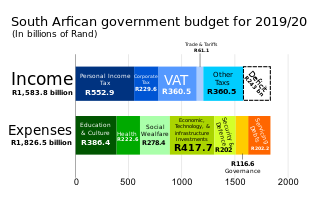
A carbon tax is a tax levied on the carbon emissions required to produce goods and services. Carbon taxes are intended to make visible the "hidden" social costs of carbon emissions, which are otherwise felt only in indirect ways like more severe weather events. In this way, they are designed to reduce carbon dioxide (CO
2) emissions by increasing prices of the fossil fuels that emit them when burned. This both decreases demand for such goods and services that produce high emissions and incentivizes efforts to make them less carbon-intensive. In its simplest form, a carbon tax covers only CO2 emissions; however, they can also cover other greenhouse gases, such as methane or nitrous oxide, by taxing such emissions based on their CO2-equivalent global warming potential. When a hydrocarbon fuel such as coal, petroleum, or natural gas is burned, most or all of its carbon is converted to CO
2. Greenhouse gas emissions cause climate change, which damages the environment and human health. This negative externality can be reduced by taxing carbon content at any point in the product cycle. Carbon taxes are thus a type of Pigovian tax.
A fuel tax is an excise tax imposed on the sale of fuel. In most countries the fuel tax is imposed on fuels which are intended for transportation. Fuels used to power agricultural vehicles, and/or home heating oil which is similar to diesel are taxed at a different, usually lower rate. The fuel tax receipts are often dedicated or hypothecated to transportation projects so that the fuel tax is considered by many a user fee. In other countries, the fuel tax is a source of general revenue. Sometimes, the fuel tax is used as an ecotax, to promote ecological sustainability. Fuel taxes are often considered by government agencies such as the Internal Revenue Service as regressive taxes.

The fuel protests in the United Kingdom were a series of campaigns held in response to the rising petrol and diesel fuel prices for road vehicle use. There have been three notable campaigns amongst many other protests in the 21st century. The first major protest in 2000 was primarily led by independent lorry owner-operators. One group of lorry owner-operators from the South East of England formed a protest group called "TransAction" that protested at oil refineries and fuel depots in Essex. Protests and blockades of oil facilities caused widespread disruption to the supply of petroleum products. The aim of the protests was to secure a reduction in the fuel duty rate on petrol and diesel, which the government refused to enact. After the protest ended, the government did announce a freeze on fuel duties, and promised changes would be made to the way that goods vehicles were taxed, which would include the taxing of foreign vehicles operating on British roads.
Excise tax in the United States is an indirect tax on listed items. Excise taxes can be and are made by federal, state and local governments and are not uniform throughout the United States. Certain goods, such as gasoline, diesel fuel, alcohol, and tobacco products, are taxed by multiple governments simultaneously. Some excise taxes are collected from the producer or retailer and not paid directly by the consumer, and as such often remain "hidden" in the price of a product or service, rather than being listed separately.

Liquid fuels are combustible or energy-generating molecules that can be harnessed to create mechanical energy, usually producing kinetic energy; they also must take the shape of their container. It is the fumes of liquid fuels that are flammable instead of the fluid. Most liquid fuels in widespread use are derived from fossil fuels; however, there are several types, such as hydrogen fuel, ethanol, and biodiesel, which are also categorized as a liquid fuel. Many liquid fuels play a primary role in transportation and the economy.

Taxation in the United Kingdom may involve payments to at least three different levels of government: central government, devolved governments and local government. Central government revenues come primarily from income tax, National Insurance contributions, value added tax, corporation tax and fuel duty. Local government revenues come primarily from grants from central government funds, business rates in England, Council Tax and increasingly from fees and charges such as those for on-street parking. In the fiscal year 2014–15, total government revenue was forecast to be £648 billion, or 37.7 per cent of GDP, with net taxes and National Insurance contributions standing at £606 billion.

A Finance Act is the headline fiscal (budgetary) legislation enacted by the UK Parliament, containing multiple provisions as to taxes, duties, exemptions and reliefs at least once per year, and in particular setting out the principal tax rates for each fiscal year.

Autogas or LPG is liquefied petroleum gas (LPG) used as a fuel in internal combustion engines in vehicles as well as in stationary applications such as generators. It is a mixture of propane and butane.

Fuel dyes are dyes added to fuels, as in some countries it is required by law to dye a low-tax fuel to deter its use in applications intended for higher-taxed ones. Untaxed fuels are referred to as "dyed", while taxed ones are called "clear" or "white".

Motoring taxation in the United Kingdom consists primarily of vehicle excise duty, which is levied on vehicles registered in the UK and hydrocarbon oil duty which is levied on the fuel used by motor vehicles. VED and fuel tax raised approximately GB£32 billion in 2009, a further £4 billion was raised from the value added tax on fuel purchases. Motoring-related taxes for fiscal year 2011/12, including fuel duties and VED, are estimated that will amount to more than GB£38 billion, representing almost 7% of total UK taxation.
The Fuel Price Escalator, a fuel duty policy in the United Kingdom ahead of inflation, was introduced in March 1993 as a measure to stem the increase in pollution from road transport and cut the need for new road building at a time of major road protests, at Twyford Down and other locations. Set initially at 3% above inflation it was increased in two stages to 6% before being suspended and then, in 2011, replaced by a 'fuel duty stabiliser' following further increases in the price of oil.

The usage and pricing of gasoline results from factors such as crude oil prices, processing and distribution costs, local demand, the strength of local currencies, local taxation, and the availability of local sources of gasoline (supply). Since fuels are traded worldwide, the trade prices are similar. The price paid by consumers largely reflects national pricing policy. Most countries impose taxes on gasoline (petrol), which causes air pollution and climate change; whereas a few, such as Venezuela, subsidize the cost. Some country's taxes do not cover all the negative externalities, that is they do not make the polluter pay the full cost. Western countries have among the highest usage rates per person. The largest consumer is the United States.

The Treasury of the Isle of Man is the finance department of the Isle of Man Government. It prepares the annual budget for the Government, and also handles taxation, customs and excise, economic affairs, information systems, internal audit, currency and the census in the Isle of Man.

An excise, or excise tax, is any duty on manufactured goods that is levied at the moment of manufacture rather than at sale. Excises are often associated with customs duties ; customs are levied on goods that become taxable items at the border, while excise is levied on goods that came into existence inland.
Biodiesel is rapidly becoming more common in a number of developed countries and the environmental effects of using biodiesel either as a blend such as B20 or as a straight fuel stock may be different in various countries. This is because the allowable amounts of sulphur and other compounds vary from country to country. Additionally, the average temperature in a country will dictate the amount of biodiesel that can be blended into the fuel supply before the cold filter plugging point renders the fuel unusable. The national annex of BS EN 14214 specifies a maximum CFPP for B100 biodiesel of -15 °C in the winter and -5 °C for the rest of the year. As such, the benefits and disadvantages of biodiesel will vary from those in the United Kingdom.

The United States federal excise tax on gasoline is 18.4 cents per gallon and 24.4 cents per gallon for diesel fuel. The federal tax was last raised October 1, 1993 and is not indexed to inflation, which increased 93% from 1993 until 2022. On average, as of April 2019, state and local taxes and fees add 34.24 cents to gasoline and 35.89 cents to diesel, for a total US volume-weighted average fuel tax of 52.64 cents per gallon for gas and 60.29 cents per gallon for diesel.
The main fuel tax in Australia is an excise tax, to which Goods and Services Tax ("GST") is added. Both taxes are levied by the federal government. In Australia the GST is applied on top of the fuel excise tax. In some cases, businesses may be entitled to exemptions or rebates for fuel excise tax, including tax credits and certain excise-free fuel sources.

Taxation may involve payments to a minimum of two different levels of government: central government through SARS or to local government. Prior to 2001 the South African tax system was "source-based", where in income is taxed in the country where it originates. Since January 2001, the tax system was changed to "residence-based" wherein taxpayers residing in South Africa are taxed on their income irrespective of its source. Non residents are only subject to domestic taxes.

In the United Kingdom, the value-added tax was introduced in 1973, replacing Purchase Tax, and is the third-largest source of government revenue, after income tax and National Insurance. It is administered and collected by HM Revenue and Customs, primarily through the Value Added Tax Act 1994.
The kerosene tax is an ecotax on the kerosene-based jet fuel in commercial aviation, which can be levied within and by the European Union. The legal basis for it is the Energy Taxation Directive (2003/96/EG) of 27 October 2003, which proves the member states with the option of introducing a tax on turbine fuel for commercial domestic flights and flights between member states.













